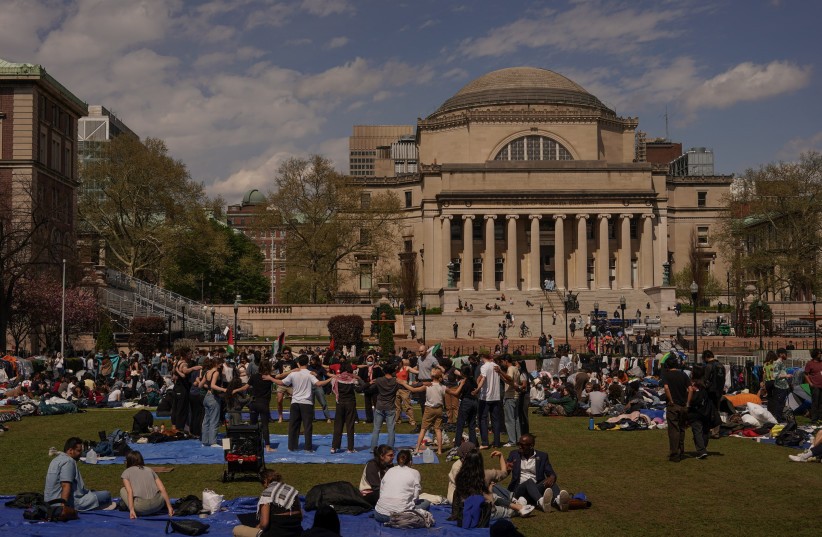As Columbia University deadline approaches, protesters set to confront NYPD
After a midnight negotiation deadline passed on Wednesday, Columbia University anti-Israel activists may be set to face an attempt by law enforcement to remove the week-long encampment.
The deadline was pushed back to 8 a.m., with students amassing at the university in response to a possible confrontation with police, according to the protest group People’s Forum New York City. The Palestinian Youth Movement said that students had organized themselves into group formations to prevent law enforcement from entering the encampment.
CUAD coalition
Columbia University Apartheid Divest (CUAD) claimed that the administrators warned activist negotiators that they would summon the National Guard and the New York Police Department if the students did not meet their demands.
“Since good faith negotiations are impossible if one side threatens to use force to extract concessions, the student negotiating team has left the table and refuses to return until there is a written commitment that the administration will not be unleashing the NYPD or the National Guard on its students,” CUAD coalition member Students for Justice in Palestine said in a statement.
In addition to demanding that the university adopt BDS policies, CUAD published an open letter from an arrested student on Tuesday, urging fellow activists to “halt the functioning of the university by any means necessary until Columbia grants full amnesty to students who participated in the Columbia solidarity encampment.”

“We ask you to take labor actions including but not limited to withholding grading labor, calling in sick, and refusing to administer exams or submit final grade until these demands are met,” said the letter.
Columbia University President Minouche Shafik said in a Tuesday statement that she hoped that negotiations were successful, but if they were not, “we will have to consider alternative options for clearing the West Lawn and restoring calm to campus so that students can complete the term and graduate.”
“The encampment raises serious safety concerns, disrupts campus life, and has created a tense and, at times, hostile environment for many members of our community. It is essential that we move forward with a plan to dismantle it,” said Shafik. “We will not tolerate intimidating, harassing, or discriminatory behavior. We are working to identify protestors who violated our policies against discrimination and harassment, and they will be put through appropriate disciplinary processes. The right to protest is essential and protected at Columbia, but harassment and discrimination are antithetical to our values and an affront to our commitment to be a community of mutual respect and kindness.”
Shafik announced on Monday that all classes would be held remotely. She noted Tuesday that she was cognizant that Columbia’s seniors had already spent their first year learning online because of the COVID-19 pandemic. She said she wanted students to celebrate graduation properly.
Amid controversy over pro-terrorism rhetoric and threats to Jewish and pro-Israel students, additional security measures were taken at the Hillel Kraft Center and the security patrol doubled. The school also increased perimeter security and identification checks as non-student activists have been able to enter the campus.





Comments are closed.